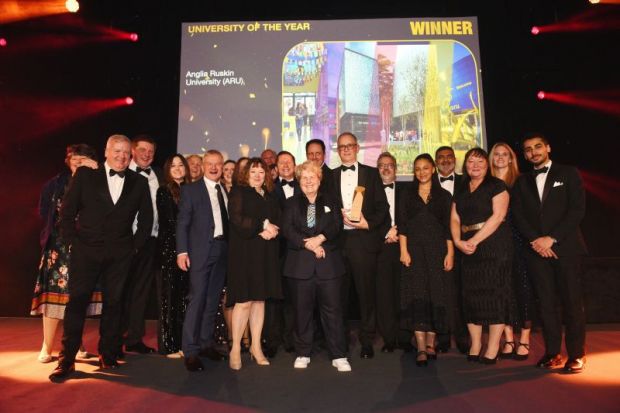University of the Year
Helping to create a new university for one of the UK’s fastest-growing cities, providing public service education for the NHS and police, aiming for research “relevant to the local populations we serve” – Anglia Ruskin University bills its Times Higher Education University of the Year award as recognition of years of work and an antidote to negative press coverage of universities.
Award judges described ARU – which has campuses across the east of England in Cambridge, Chelmsford and now Peterborough, plus a London branch – as a “university that knows what and who it is for, and is delivering”.
“We’re a regional university; we do a lot of really positive public service work; we’re really proud of our widening participation credentials” alongside “really great outcomes” for graduates, said James Rolfe, ARU’s chief operating officer.
ARU recruits heavily from some of the most deprived areas in the east and across the UK, he added, while being ranked in the top 15 per cent in the country for graduates in employment or further study after graduation, and third in the country for graduates employed as managers, directors or senior officials, according to the Higher Education Statistics Agency’s Graduate Outcomes survey.
December 2022 saw the opening of the £30 million ARU Peterborough, a collaboration with the Cambridgeshire and Peterborough Combined Authority and Peterborough City Council, fulfilling a three-year project and a decades-long desire to create a university for Peterborough.
With a fast-growing population and particularly a growing young population, Peterborough was “becoming aspirational”, but there had “always been a lower uptake to higher education”, said Mr Rolfe. “The university is a direct intervention” to boost the city’s levels of higher education, he added, describing it as “a brilliant collaborative effort”.
Meanwhile, ARU’s focus on nursing and paramedic courses, including degree apprenticeships, makes it “the largest provider of health students into the health service and the social care sector in the east of England, and one of the largest in the UK”, said Mr Rolfe. The university has also opened Essex’s first medical school: the Anglia Ruskin School of Medicine in Chelmsford graduated its first students in summer 2023.
In ARU’s research, key elements include its Vision and Eye Research Institute, working on fields such as glaucoma.
ARU’s Cambridge Institute of Music Therapy, whose work includes using music to help patients with dementia, won a Queen’s Anniversary Prize in 2021, recognising innovation that delivers public benefit.
The university also operates the Policing Institute for the Eastern Region, which aims to improve policing through applied research, including to inform the criminal justice response to sexual violence against adults and children.
“We very much want to be a university that’s relevant to the local populations we serve,” said Mr Rolfe of ARU’s improved research performance, which also saw it achieve its highest-ever Research Excellence Framework ranking in 2021, with nine subject areas judged to have achieved “world-leading” impact.
The top THE award followed long-running strategic efforts at the university and “is the culmination of a lot of work by a lot of people across the university”, said Mr Rolfe.
“It’s very easy to be distracted by stories about universities in the national media: the negative press. Actually, this [award] is testament to the positive and great work that all our university staff are doing,” he added.
john.morgan@timeshighereducation.com
Most Innovative Teacher of the Year
Despite teaching at the forefront of the futuristic worlds of cryptography and cybersecurity, Bill Buchanan still believes that one of a teacher’s most important tools is a blackboard and chalk.
In his attempts to find a human connection with ever-growing numbers of online-only students at Edinburgh Napier University – where he teaches computer science – Professor Buchanan has, on occasion, abandoned the piece-to-camera approach to lectures and just filmed himself doodling along with what he was saying.
Analysing the statistics later, he found the doodle lectures did not suffer from the usual drop-off in engagement and viewers appeared to watch all the way through.
Finding new ways to tap into his students’ myriad ways of learning is one tenet of Professor Buchanan’s approach to teaching, which has led to an ever-growing list of side projects from a heavily visited website – asecuritysite.com – a decade-old YouTube channel and online coding challenges to a guest lecture series that connects his students with the biggest names in cybersecurity.
The other tenet, according to Professor Buchanan, is never allowing himself to go stale, which brings as many benefits for his own well-being as it does for his students.
“The goal is to humanise education. If you become a machine and automate things, you’ve lost that,” he said.
“If you teach the same thing every year, it becomes boring. If you bring innovation, change something, force yourself to address the problems from the past, every class is new.”
Tom Williams
Outstanding Marketing/Communications Team
Claire Hamilton, the University of Sheffield’s deputy director of marketing and student recruitment, described the campaign that won this award as “quite radical”. A former employee of Sheffield Hallam University, Ms Hamilton had long hoped to bring the two institutions together for a marketing campaign that promoted not only the universities, but the city itself. “I’m from Sheffield, and I really believe that it is one of the best places to live for so many reasons,” she said.
In 2022, the universities did just that, working with Sheffield City Council to launch a multichannel marketing campaign aimed at 16- to 18-year-olds in their target demographic areas. A 30-second advert highlighted Sheffield’s “home from home” feeling, featuring a teleporting yellow sofa that transported a diverse cast to locations around the region. Running ahead of clearing, the advert directed applicants to a “Welcome to Sheffield” website, from which they could progress to their desired institution’s site.
The campaign was a success, with both institutions far exceeding their recruitment objectives, and the team has collaborated on further ventures including recruitment fairs and open days.
“I wouldn’t be surprised if there are other universities and cities like Sheffield that are considering coming together in this way,” said Richelle Quinn, head of strategic marketing at Sheffield Hallam. “For us as a post-92 university, our research was telling us that, in cities with two universities, the post-92 will thrive if the redbrick thrives. It’s in our interests to work together and support each other.”
Emily Dixon
Outstanding Research Supervisor of the Year
It is often assumed that most PhD students are academics-in-waiting who have glided effortlessly from school to university and then into postgraduate education, supported by generous grants.
That archetype might have a certain romance, but is woefully outdated and, more importantly, might deter potential research students from undertaking doctorates, insisted Mark Brown, professor of evolutionary ecology and conservation at Royal Holloway, University of London, whose commitment to encouraging non-traditional applicants into PhD study helped him win this award.
“We need to work harder…to make sure people understand what a PhD is – and isn’t – that there are many valid motivations for doing a PhD, and that a PhD gives you skills that are applicable to multiple careers,” said Professor Brown. “Otherwise, we risk the continual exclusion of people who do not fit the traditional image of what a PhD student looks like, to the detriment of research and broader society.”
Half of Professor Brown’s research students have been first-in-family graduates and have often overcome significant academic and personal challenges to reach PhD study. His PhD students also spoke about his invaluable support in navigating financial hardship, health problems and trauma throughout their doctoral studies.
Adapting supervision to each PhD student was vital, said Professor Brown. “I rely on my own past experience as supervisor and student, along with the observations of others to support my supervision approaches. However, this is not enough – without empathetic listening, reflection and subsequent proactive modification and development of my practice, supervision will fall short. Every student deserves supervision that works for them, not just for me.”
Jack Grove
Outstanding Entrepreneurial University
Music education and entrepreneurship might not traditionally have been seen as bedfellows, but the Royal Northern College of Music (RNCM) has set out to change that, recognising that nearly one in four creative arts graduates will embark on freelance careers.
Alongside tuition as performers, composers, songwriters and producers, more than a third of RNCM students’ degree credits are focused on entrepreneurial skills, including those in finance, tax, project planning and management, networking, idea generation and pitching.
Students undertake paid freelance work alongside their studies via the Manchester conservatoire’s own in-house talent-booking agency.
“We work with our students as colleagues, as partners in their programmes of studies and as musicians already beginning their careers,” said Michelle Phillips, senior lecturer in music psychology at RNCM.
Dr Phillips, who is also head of academic enterprise, said it was important to RNCM that entrepreneurship was not seen as creating economic value only, nor was that view in line with students and their motivations.
“They want to have an impact on the world with their music; they want to make a difference and to make the world a better place,” she said.
“We support them to generate ideas about challenges in the world, and to use their music to contribute to solutions.”
The institution is not likely to rest on its laurels. It is expanding its entrepreneurship training into other areas, including introducing more tax and finance training into its MA programme, and growing its network of industry partners who work with students.
Patrick Jack
Learn more about all the winners in our special publication
POSTSCRIPT:
Print headline: Know what you’re for, and deliver – winners’ secrets
Register to continue
Why register?
- Registration is free and only takes a moment
- Once registered, you can read 3 articles a month
- Sign up for our newsletter
Subscribe
Or subscribe for unlimited access to:
- Unlimited access to news, views, insights & reviews
- Digital editions
- Digital access to THE’s university and college rankings analysis
Already registered or a current subscriber? Login










